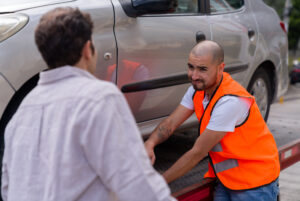 Lenders are not required to notify the borrower in advance of an auto repossession. However, after a vehicle has been taken, the lender must send a letter to the borrower outlining terms to get the vehicle back — whether the lender is a bank, such as Well Fargo or Bank of America, a credit union, such as Pennsylvania State Employees Credit Union or Erie Federal Credit Union, or a financial institution such as Driveway Finance or PA Auto Credit. The repossession letter, often called a Notice of Intent to Sell Property, details the location of the vehicle and where personal property may be picked up, the amount to be paid to retrieve the vehicle, and the time period in which the borrower must act before the vehicle is sent to an auction or private sale to be sold.
Lenders are not required to notify the borrower in advance of an auto repossession. However, after a vehicle has been taken, the lender must send a letter to the borrower outlining terms to get the vehicle back — whether the lender is a bank, such as Well Fargo or Bank of America, a credit union, such as Pennsylvania State Employees Credit Union or Erie Federal Credit Union, or a financial institution such as Driveway Finance or PA Auto Credit. The repossession letter, often called a Notice of Intent to Sell Property, details the location of the vehicle and where personal property may be picked up, the amount to be paid to retrieve the vehicle, and the time period in which the borrower must act before the vehicle is sent to an auction or private sale to be sold.
Let’s face it. Car repossessions never occur at convenient times. A variety of reasons may have caused default on the loan. The borrower may be suffering an illness or from a death in the family, be going through divorce, or had a job loss. Regardless, once the vehicle has been taken, the borrower must take steps to locate it and find out how to get it back. As well, the lender must follow the law.
The Role of the Repo Agent
 After the lender has made the decision to repossess a vehicle, arrangements are made with a repo agent who will locate the vehicle and take it, often without warning. In advance of the repossession, the repo agent must inform the local police department of their intent to seize the vehicle. The repo agent may come with a tow truck to the borrower’s home or place of employment. Or, they may track the vehicle
After the lender has made the decision to repossess a vehicle, arrangements are made with a repo agent who will locate the vehicle and take it, often without warning. In advance of the repossession, the repo agent must inform the local police department of their intent to seize the vehicle. The repo agent may come with a tow truck to the borrower’s home or place of employment. Or, they may track the vehicle  finding it at another location, such as at a shopping mall, doctor’s office, or the address of a family member or friend. Sometimes at the time of purchase, the dealership may have installed a GPS tracking device or a remote control car disabler. The repo agent may use these devices to track vehicles that have been assigned for repossession.
finding it at another location, such as at a shopping mall, doctor’s office, or the address of a family member or friend. Sometimes at the time of purchase, the dealership may have installed a GPS tracking device or a remote control car disabler. The repo agent may use these devices to track vehicles that have been assigned for repossession.
 In Pennsylvania, a repossession agent has to be licensed with the Department of Banking and Securities of the Commonwealth and may be hired by a bank, credit union or finance company to repossess cars, trucks motorcycles, RVs, powersport vehicles, boats or airplanes. If a vehicle is missing, the borrower should make calls to the local police and the lender to confirm it was not stolen.
In Pennsylvania, a repossession agent has to be licensed with the Department of Banking and Securities of the Commonwealth and may be hired by a bank, credit union or finance company to repossess cars, trucks motorcycles, RVs, powersport vehicles, boats or airplanes. If a vehicle is missing, the borrower should make calls to the local police and the lender to confirm it was not stolen.
Wrongful Repossession by the Repo Agent
-
-
-
- Breach the Peace
- Enter a closed garage to get your vehicle
- Damage your car or property during the repossession
- Threaten arrest or violence
- Force you to pull over while driving
- Involve the police to aid in the repossession
-
-
If you feel the repo agent handled the repossession improperly, gather documents that illustrate what happened and when, such as a written statement of events; photographs or video of the scent, and witness statements. Contact an experienced consumer protection law firm to evaluate whether your consumer rights were violated.
Borrower’s Rights
Borrowers have legal rights, whether payments were missed or not – without filing for bankruptcy. If you believe your vehicle may have been wrongfully repossessed, review the terms of the loan agreement to understand steps that may be taken after default. In addition, gather all correspondence sent from the lender after the repossession. Consult with an experienced consumer protection attorney to evaluate whether your consumer rights were violated.
Your signed Loan agreement
If the loan agreement has been misplaced or was left inside the
repossessed car, the borrower could obtain a copy either by
contacting the lender or the dealership where the vehicle was
purchased.
Gather the following documents sent by the lender after repossession.
Repossession Notice from the lender
This notice will state terms to retrieve the vehicle. The lender
may demand full payment of the loan, or accept past due payments
plus late fees, and costs associated with repossession and storage.
When the borrower can not meet the payment terms to recover the
vehicle, the lender will sell it, either at an auction or private sale.
Deficiency Notice from the lender
Once a vehicle is sold, the lender must inform the borrower of the
sale by sending a letter known as a Deficiency Letter which details
the balance to satisfy the loan.
Retrieve Personal Property
The borrower has 30 days from the date of the repossession notice to recover personal property. Afterwards, the repo agent may dispose of the property. If you believe your vehicle is at the risk of repossession, it may be a good idea to remove all personal items and paperwork from the vehicle.
Seek experienced consumer lawyers firm
 Flitter Milz has the expertise in representing borrowers whose vehicles have been wrongfully repossessed by banks, credit unions and financial companies. Contact us today for a no cost legal evaluation to determine whether your consumer rights have been violated.
Flitter Milz has the expertise in representing borrowers whose vehicles have been wrongfully repossessed by banks, credit unions and financial companies. Contact us today for a no cost legal evaluation to determine whether your consumer rights have been violated.
Pictured: Cary Flitter (center), Andy Milz (left), Jody López-Jacobs (right).








